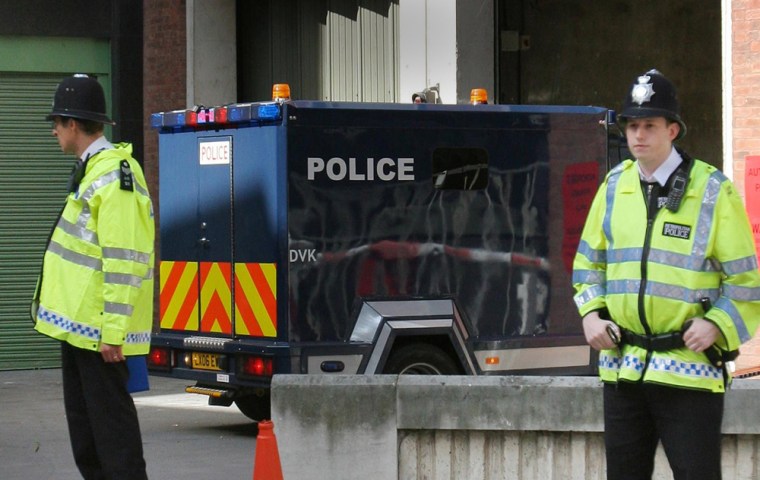Impassive and staring straight ahead, an Iraqi doctor was led into court by plainclothes security officers Saturday, the first suspect to appear on charges of plotting to bomb London’s entertainment district and Scotland’s busiest airport.
Police stepped up security across the British capital, where Prime Minister Gordon Brown laid flowers outside one of the train stations hit two years ago in suicide bombings that killed 52 commuters in the first militant Islamic strike on the United Kingdom.
Bilal Abdullah, a 27-year-old doctor born in Britain and raised in Iraq, was the only person in City of Westminster Magistrates Court to remain seated when the judge entered the room to the customary cry of “All rise!”
Abdullah was asked to stand, and did, as the charge of conspiring to cause explosions was read out. The charge against Abdullah refers to a plot taking place between Jan. 1 and July 1, suggesting prosecutors believe the attacks were planned well in advance.
U.K. remains on ‘severe’ alert
Stocky, unshaven and wearing a white sweat shirt, he sat expressionless in the dock, speaking only to confirm his name and date of birth during the brief hearing. Seven other suspects have been detained over the foiled car bomb attacks.
His lawyers did not seek bail, and judge Anthony Evans ordered Abdullah held at a high-security prison until his next hearing, at London’s Central Criminal Court on July 27.
Britain remains on “severe” terrorism alert — the second-highest level — in the wake of the attacks. Police added patrols around London as the city marked the anniversary of the July 7, 2005 bombings with a simple and somber ceremony outside King’s Cross rail and subway station on one of the busiest tourist weekends of the summer, with the first leg of the Tour de France, the Wimbledon women’s final and the Live Earth concert all under way.
Memorials for 7/7 bombing victims
Brown and other government ministers joined survivors and relatives of the dead in laying bouquets and wreaths of flowers at a memorial garden to the victims. More than 700 people were injured in the rush-hour attacks on three subway trains and a double-decker bus.
London Mayor Ken Livingstone left flowers and a card reading: “The bombers tried to divide us and they failed.”
John Falding, who lost his partner Anat Rosenberg in the bus bomb, said terrorists would never win.
“The more this goes on, the more they will realize how futile their efforts are,” he said. “The more London shows its bravery, the more we show this is our victory.”
‘This country is united’
In Glasgow, several hundred people — from Muslims to Quakers, teenagers to trade unionists — demonstrated to voice their opposition to terrorism.
“We want to send the message that this country is united,” said organizer Osama Saeed of the Muslim Association of Britain. “It won’t be shaken by terrorism.”
The Glasgow area is home to about half of Scotland’s 60,000 Muslims. There are some 1.6 million Muslims in Britain.
Counterterrorism agents claim they have foiled several attacks in Britain since the July 7 bombs, including a plot to blow up several trans-Atlantic airliners, prevented by a string of arrests last August, and the recent failed car bomb attacks.
In an interview with The Sunday Telegraph, Britain’s new security minister, Adm. Alan West, urged Britons to help prevent people being recruited into extremism by informing on any terrorists secretly living within their ranks.
“Britishness does not normally involve snitching or talking about someone. I’m afraid, in this situation anyone who’s got any information should say something because the people we are talking about are trying to destroy our entire way of life,” said West, a former head of the Royal Navy.
Indians among those being held
The latest plot was discovered when emergency workers spotted two cars packed with gas cylinders and nails June 29 in the busy heart of London’s West End — one outside a crowded nightclub, the other near Trafalgar Square. The next day, the Jeep smashed in flames into the security barriers at Glasgow airport.
Prosecutors suspect Abdullah and Kafeel Ahmed, believed to be the driver of the Jeep, carried out the attempted bombings in London before they returned to Scotland — where Abdullah worked at a Glasgow-area hospital — and attacked the airport.
One of the suspects is being held in Australia. There are seven detained in Britain, including a man hospitalized in critical condition in Scotland with severe burns from the attack on the airport.
He has been identified as Ahmed, from Bangalore, India, who holds a doctorate in aeronautical engineering and studied at Queen’s University in Belfast, Northern Ireland, and Anglia Polytechnic University in Cambridge, England. Abdullah also lived for a time in Cambridge, the quiet university city north of London.
Another suspect is Sabeel Ahmed, 26, an Indian doctor arrested in Liverpool, whom relatives confirmed is the brother of Kafeel Ahmed. In India, the Ahmed family’s lawyer, Mohammed Javed, said the family spoke to Sabeel several days ago while he was in detention, and he told them he was fine. He declined to comment further.
Worked in medical profession
Most of the suspects worked for Britain’s health service and come from countries in the Middle East and India.
In Australia, police seized computers from two hospitals Friday as they explored connections between the British plotters and Muhammad Haneef, an Indian doctor arrested there.
The others in custody are Mohammed Asha, 26, a doctor arrested in central England; his wife, Marwa Asha; and two men aged 25 and 28 arrested at the hospital near Glasgow where Abdullah also worked. They have not been identified.
An Iraqi Interior Ministry spokesman said authorities were gathering information about Abdullah.
“This is the name of an Iraqi man and it is important for us to gather information about him and there will be cooperation between us and British authorities,” Maj. Gen. Abdul-Karim Khalaf told The Associated Press.
